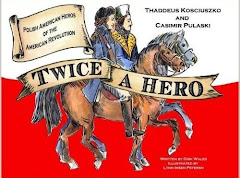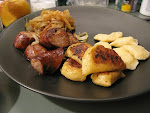
Legends play a key role in today’s society and played an even bigger role in our society’s past. These stories were passed down from generation to generation, usually among the peasant class. Typically, the stories would change each time they were told since they were not written down. Thus, legends evolved from possibly rational and otherwise accurate events but were twisted over time as a result of retelling.
I am lucky and grateful that my Polish heritage has such rich and even inspiring legends. My grandfather gave my father a book about Polish legends, which I have read multiple times. I grew up with these legends and I am proud to say that I am Polish in knowing that. A few of my favorite legends go back to when I was a child. I was transfixed with looking at each individual picture and studying it as my father read aloud. My top three legends include the Story of Popiel, Who Was Eaten by the Mice; the Legend of Wanda, Who Drowned Herself Rather than Marry a German and the Trumpeter of Krakow.
I am lucky and grateful that my Polish heritage has such rich and even inspiring legends. My grandfather gave my father a book about Polish legends, which I have read multiple times. I grew up with these legends and I am proud to say that I am Polish in knowing that. A few of my favorite legends go back to when I was a child. I was transfixed with looking at each individual picture and studying it as my father read aloud. My top three legends include the Story of Popiel, Who Was Eaten by the Mice; the Legend of Wanda, Who Drowned Herself Rather than Marry a German and the Trumpeter of Krakow.
The Story of Popiel is one of my favorites. Actually, this story is much like Shakespeare’s Macbeth. The Story of Popiel tells of a Polish King and his Queen and their treachery towards Poland. The Popiel and Macbeth, both acting as tyrants, share many characteristics. These characteristics include greed, cruelty and lack of good intentions for the country. King Popiel was a wicked man and his wife, though beautiful, was more wicked than he. The King went against the ways of previous kings and princes, which accounted towards the people’s hatred for their king. If anyone protested, they were tortured. The royalty let the Polish people go hungry and live in poverty. Eventually, the King's uncles turned against him and a most evil plan was devised. Rather than fight the uncles on the battlefield, the Queen insisted that Popiel invite them in to feast with them as a means of forgiveness and truce. Popiel gave a toast while his wife poured out the libations. After the toast, the first uncle realized they had all been poisoned, grabbed his weapon that was mounted on the wall and attempted to slay Popiel. After he died, the other uncles soon made attempts to kill Popiel but they could not. By the time the last uncle died, Popiel and his Queen stood laughing over the bodies. Soon enough it was discovered that mice were rising out of the lake and began to swarm the castle. Popiel and the Queen ran to the tallest tower in hopes of escaping, but they soon perished and were eaten by the mice. The death of Popiel and his wife was a turning point for Poland and the country was able to build itself up once again.
The Legend of Wanda is another tale that is very unique both in meaning and in content. The Legend of Wanda tells of Polish Queen Wanda. Wanda was the daughter of Krakus and became Queen after her eldest brother was murdered and her other brother was banished. Wanda was beautiful, wise and concerned with about interests of Poland. Wanda led many wars and helped Poland to prosper and grow in wealth and patriotism. Many princes were trying to acquire her hand in marriage. In fact, the King of Germany sent messengers and a letter to Wanda asking her for her hand in marriage. The German King stated that if she refused his offer, the German armies would attack Poland and send the country into turmoil. Wanda couldn’t let Poland fall to the hands of Germans through marriage or by attack. Upon little thought, Wanda ran to her quarters where she prayed to the gods that if she were to sacrifice herself that Poland would remain strong and whole. Wanda then ran to the Vistula and drowned herself. Today Wanda’s story is very well-known and she is a highly respected woman by all of Poland.
The Trumpeter of Krakow tells of one of the most heroic tales about the ancient capital of Poland. It was custom for a trumpeter to play the Hejnal four times every hour atop the tallest tower of the Church. One day the trumpeter saw a mass of dust forming over the land as the Tartars were approaching. He knew that he needed to warn the people of Krakow but running down to the streets would be a waste of time. The trumpeter began to play the Hejnal, over and over again. This caught the townspeople’s attention and they soon realized danger was approaching. Soldiers prepared themselves and families hid themselves safely away. When the Tartars reached Krakow they realized what the trumpeter was doing. The Prince of the Tartars took his bow and arrow and killed the trumpeter, who remained on top of the Church. When the trumpeter was shot the Hejnal ended on a broken note. To this day the Hejnal is played every hour in Krakow and ends abruptly on a broken note in memory of the brave trumpetor.
These legends describe ancient Poland at times of desperation and times of greatness. These legends tell of Poland’s heroes that led Poland out of brokenness and into triumph. Legends are what made up our past, they make up our present and I’m sure they will have an influence on our future.
958



Nicole, a polish blog is such a good idea. I loved reading all the legends that you talked about and learning more about Poland. Something easy to watch out for is your placement of comas or periods in a senatsnce. Just so that way it flows better and doesn't sound so choppy. Other than that I really enjoyed this post.
ReplyDeleteEx) Legends were invented as a result of not knowing because people needed reasons to explain things they otherwise could not
I really liked how you had so much information and that you had such a variety of legends and information. I also like the legends that you chose and that they were your favorite ones, which makes the posting more personal. Even with this, I found the blog to be a little bit too formal. I also did not understand this statement in the top of the second paragraph:My grandfather gave my father a book about Polish legends and I have been reading them repeatedly for as long as I can imagine.I did not understand the last part where you said "for as long as I can imagine" and it did not make sense to me.
ReplyDeleteYou do a great job simply summarizing the three folktales here. You also make clear connections to the lesson or historical significance of each legend.
ReplyDeleteNow, a criticism. Lose the "Webster's defines...." technique. It's overdone.
This is awkward: "Legends were invented as a result of not knowing because people needed reasons to explain things they otherwise could not."
This too:I grew up with these legends and I am proud to say that I am Polish in knowing that.
There's that contradictory problem again: "The Story of Popiel is by far one of my favorites." It's one of your favorites? Or is it by far your favorite?